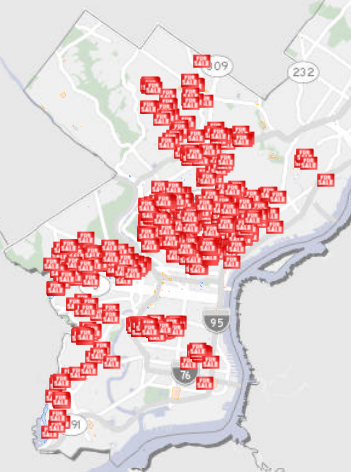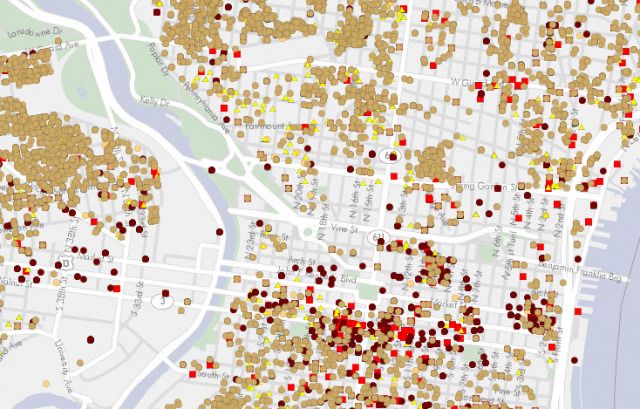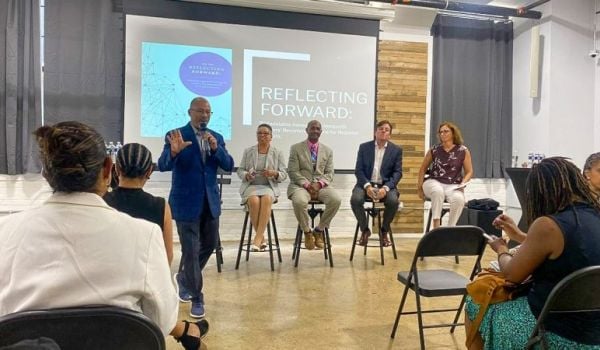You probably know more about the locale for tomorrow night’s House Hunters International, or the flavors on next week’s Cupcake Wars, than you do about construction planned for across your street or building code violations on your block.
Ever since Walter Annenberg invented TV Guide (in Philadelphia, by the way), the accessibility of programming data has been continuously improved. And since one thing leads to the next, these days you can access that TV schedule from a device in your pocket and then program your DVR to record shows, post the fact that you’ve scheduled a recording on social media, etc., etc. and, let me just say, etc.
The technology that enables this very contemporary reality TV-topia isn’t restricted to one’s viewing habits. Innovations in digital media and wireless technology have literally remade how we consume information, putting formerly ubiquitous technologies such as the traditional boob tube on the fast train to obsolescence, “disrupting” the existing market and, in turn, the way we perform basic activities.
In Philadelphia, there has been lots of talk — and progress — about disrupting the way we as citizens interact with our government. In particular, there has been quite a bit of interest in open data — or the release of data by governments, transit agencies and others to empower citizens and engage entrepreneurs.
It turns out that someone in City Hall was listening to all the clamor. Under the leadership of Commissioner Carlton Williams, the Department of Licenses and Inspections has launched a new public tool that provides meaningful access to data, allowing people to search and map information from a huge list of topics: Vacancy and code violations, building permits, zoning appeals, food licenses, sign permits and so on.
On its face, this is pretty simple stuff: Taking information that has been around for decades, even centuries, and simply putting it into a map on a web-accessible screen. There are similar moves happening in local government, such as the Philadelphia Redevelopment Authority’s Philly LandWorks simple tool for finding and buying property, and the Office of Property Assessment’s Property Search simple tool for determining the assessed value and taxes due on property.
But this simplicity is deceiving. These tools could be the “disruptive technology” we’ve been waiting for, and could very well rock the status quo by the very virtue of their slightly retrograde simplicity. (The key citation here is Clayton Christensen’s 1997 book, The Innovators Dilemma.)

An interactive map from the Philadelphia Redevelopment Authority shows available properties around the city. Credit: PRA
The layering and accessibility of these data sets have the potential to change the practice of both policymakers and private citizens, as well as how these two relate to each other.
First, there is the empowerment that happens with more information. City officials can get better, faster answers to their questions, such as “which rec centers get the most use of basketball courts versus swimming pools?” or “what police stations use the most electricity per square foot?” And citizens can get better, faster answers to their questions, such as “how do my property taxes compare to my neighbors?” or “is that construction around the corner properly permitted?”
Second, these new tools can do more than improve the answers to existing question — they have the potential to change the questions themselves. This is often referred to as “data mining,” in which we use patterns in information to discover questions we didn’t even know to ask. Data mining is famously used by marketers to predict what people will buy — think of Amazon’s links about “people who viewed this product eventually bought these items” or “people often buy these two products together.” In the local public sector, examples include using a pattern of vermin reports to discover an emerging vector of public health issues or using a pattern of 311 calls to discover emerging community organization that could become a partner in government services.
Third, these tools have the power to transform closed and corrupt transactions into fairer, more open and ultimately more competitive markets. It is no coincidence that these new tools share a focus on land and property. That is the fundamental concern and jurisdiction of local government, the foundation on which all other local government activities are made possible. In the fog of uncertain ownership, tax delinquency and code violations, much of the Philadelphia real estate market remains locked up in a netherworld of transactions that benefit insiders.
These tools represent a game-changing opportunity to take what has been wrongfully treated as proprietary knowledge among developers and their lawyers (who owns what, with what tax bill and with which permits to develop) and transform it into public knowledge, so that anyone with an interest or an idea can participate. This is what government does to improve markets: It does not pick winners, but makes it possible for everyone to compete to win. When government share knowledge widely, everyone has a chance to compete and markets work best.
These tools can also help realize the potential of value capture policies discussed in last week’s Forefront article and, in addition, help implement those practices in a democratic and intelligent way. With open data, we can better understand the potential value increment among competing investments and benchmark the performance of tax increment financing and other arrangements. These tools can evaluate the claims of deal makers and empower the demands of those who were promised a share of the value we all have a stake in capturing.
The passion people feel for the hit real estate shows on HGTV doesn’t have to be vicarious entertainment. The chance to engage civically in city building is about to get as easy as programming your DVR.
Mark Alan Hughes is a Distinguished Senior Fellow at PennDesign and the City of Philadelphia’s founding Director of Sustainability.

Mark Alan Hughes is a Distinguished Senior Fellow at PennDesign and an Investigator at the US Department Of Energy’s Energy Efficient Buildings Hub at the Philadelphia Navy Yard. He is a Faculty Fellow of the Penn Institute for Urban Research, a Senior Fellow of the Wharton School’s Initiative for Global Environmental Leadership, and a Distinguished Scholar in Residence at Penn’s Fox Leadership Program. He has been a senior fellow at the Brookings Institution, the Urban Institute, and a senior adviser at the Ford Foundation. He was the Chief Policy Adviser to Mayor Michael Nutter and the founding Director of Sustainability for the City of Philadelphia, where he led the creation of the Greenworks plan. Hughes holds a B.A. from Swarthmore and a Ph.D. from Penn, joined the Princeton faculty in 1986 at the age of 25, has taught at Penn since 1999, and is widely published in the leading academic journals of several disciplines, including Economic Geography, Urban Economics, Policy Analysis and Management, and the Journal of the American Planning Association, for which he won the National Planning Award in 1992.
















